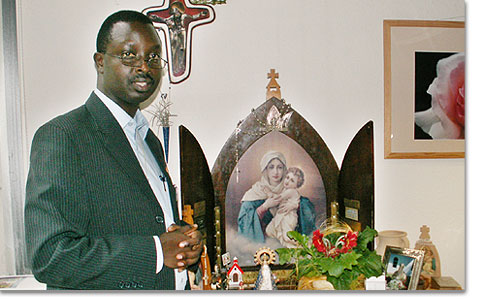
|
| P. Deogratias Marahukiro invitando con la tercera Auxiliar Internacional. En 2008, va a visitar Burundi. Fr. Deogratias Marahukiro inviting the third International
Auxiliary to visit P. Deogratias Marahukiro lädt die Internationale Auxiliar ein, im kommenden Jahr Burundi zu besuchen. Foto: POS Fischer © 2007 |
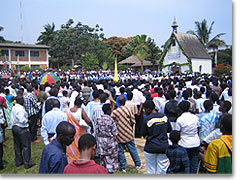 |
|
| 15 de agosto: gran peregrinación al Santuario de Mont Sion Gikungu August 15: massive pilgrimage to the Shrine at Mont Sion Gikungu 15. August: große Wallfahrt zum Heiligtum Mont Sion Gikungu |
|
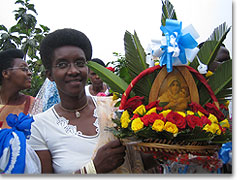 |
|
| 15 de agosto de 2007, Bujumbura: 10 años de la Campaña August 15, 2007, Bujumbura: ten years of the Schoenstatt Rosary Campaign 15. August 2007, Bujumbura: zehn Jahre Kampagne der Pilgernden Gottesmutter |
|
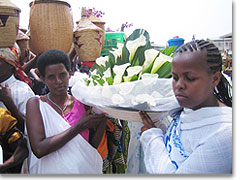 |
|
| Jaxky, de Kenia (der.) y la Sra. Gaudence, de Burundi, ofrecen flores a la Mater. Jacky from Jacky aus Kenia (rechts) und Frau Gaudence aus Burundi (links) bringen der Gottesmutter ein großes Blumengesteck zum Dank |
|
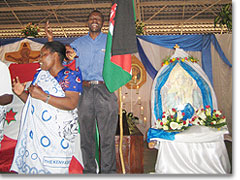 |
|
| Peregrinos de Kenia Pilgrims from Kenya Pilger aus Kenia |
|
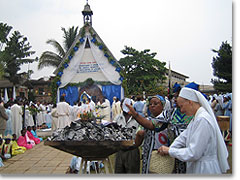 |
|
Peregrinos de Kenia con sus aportes al capital de gracias Pilgrims from Pilger aus Kenia bringen ihre Beiträge zum Gnadenkapital Fotos: Sr. Lisette Seitzer © 2007 |
|
|
BURUNDI. The Shrine, the Blessed Mother, the Capital of Grace, and the Pilgrim MTA that takes the graces of the Shrine to everyone: what Schoenstatt has built and spread for almost 100 years, also brings forth fruit in the heart of Africa. While other are searching and searching to find something that will attract people, the work with the most basic elements of Schoenstatt attracts youthful hearts to the Shrine. Throughout the next three years, the Schoenstatt Family wants to crown the Blessed Mother, along with the entire Church in Burundi, as Queen of Peace and of Reconciliation.
In the second part of the interview with Father Deogratias Marahukiro –the first Burundi Schoenstatt Father, who after a year of pastoral work with the Movement in Chile, Argentina, and Paraguay, is presently working as the national advisor of the People’s Movement and of the pilgrims – we spoke about the pastorate of the Shrine, the preparation for the coronation, and how it is possible to attract so many youth.
Tell a little about the typical Mass on the 18th or the typical Sunday Mass.
Father Deo: The truth is when I went to Switzerland or Austria and I saw five or seven people in church, it was a sad reality for me since I always celebrate Mass for a large number of faithful. Sundays are a very special days for my people, especially at Mount Zion, our pilgrimage center. The Mass usually lasts 2 or 2 1/2 hours because there are so many people, and every Sunday is a celebration. The people come to celebrate. Saturday morning we have about 300 people. We celebrate the Mass somewhere else, but very close to the Shrine, about 400 meters away.
On Sundays the people come to celebrate, it is a celebration, there is no other program, and they only come for Mass. There is much singing and there is also dancing. When there is a celebration, the people bring bananas, and everything else in the offertory procession. The people come with food, but they also give money; this is something very typical in Burundi.
After communion one must celebrate, there is a dance, there is singing and dancing, everyone dances the bishops, the priests, and the people. Father Mauricio, a Father from Chile, who now works in Burundi, did not want to dance, because in his country there is no dancing during the Mass, it is incredible for us that there is no dancing…Now he also dances.
On Covenant Day, first, we have the Mass, and then there is a Covenant ritual where the most important thing is the burning of the Capital of Grace. The contribution forms are always full. The people write their contributions up to the last moment, until the bonfire is over. This is already in the people’s blood and many people come; not only Schoenstatters, everyone comes, because everyone makes contributions to the Capital of Grace. We have made special contributions for peace; we have also sent it through the Internet, it is called a chain of rosaries for peace. This is done throughout the country: there is a form that has the outline of our country with this chain. It is an idea that I brought from Paraguay, where this was done in preparation for the jubilee of their Shrine. The people of Paraguay, the couples, made this contribution for Burundi, and I brought this from Paraguay to Burundi and the effect was incredible. The bishop, himself asked me to do it all over the country, and people are still making this contribution to the Capital of Grace, and when the forms are filled out the people ask for more because "we" want to work for "peace". Now, we are working throughout the country with the Capital of Grace, and then people come to the Shrine, they leave the forms, and each month they are presented. The subject of the Capital of Grace is very strong in Burundi. The people have undoubtedly seen that these contributions bring many graces.
As it was previously mentioned, next year you want to work with the Rosary Campaign with all the family. How does the Pilgrim MTA work in your country?
Father Deo: This year we celebrated the 10th Anniversary of the Campaign. There are many people who are enthused with the project of taking the Pilgrim MTA to every house in Burundi. The people are so open, that I always tell the missionaries that they must go out to the people; they must not keep her in their home. I am happy because there are university youth who are very committed to the Campaign. They make many contributions to the Capital of Grace, and they always come on Wednesdays; they refrain from eating to go to pray the rosary at the Shrine, and then they return to the university. It is impressive.
On Saturdays two ladies come, one is the spouse of a former president who prayed very much to the Pilgrim MTA during the time that her husband was in jail, and she is totally convinced that the Blessed Mother released her husband from jail. She wants to come to the Schoenstatt Shrine. The other lady was responsible for the Muslim ladies in Europe, she worked in Belgium. Then she returned to Burundi and she began to speak with me. She told me: There is something that attracts me, but I do not know how I am going to let the other go, because it is very difficult, because if the people see that you are praying in another religion they pressure you. But later, little by little, she was convinced, and she changed religions.
Another Muslim told that he was with the Muslims for ten years and his mother always prayed the rosary for him so that he would convert. Once he went to the Shrine and he was afraid, he said that he could not enter here because surely this lady is going to challenge me. He was afraid of the Catholics because they knew he was a Muslim. Little by little he went to the Shrine and each time he gained more security, then he began to speak with me, and he changed religion. He is very happy, he works at the Shrine, and he is very committed with the Shrine. The mothers of these two prayed very much, they are also very committed with the Shrine.
How were the first contacts made with the Congo? How did it begin? And what about Rwanda, where presently Schoenstatt is emerging, and how is the attachment with the Shrine in a country where there is no Shrine?
Father Deo: We first began in the Congo, where we had some vocations among the Sisters and Fathers in Burundi. The city of Uvira is very close to Burundi, there is always contact between Uvira and Bujumbura. We began with one person who was interested, and he transmitted this and that is how the movement began. In Bukavu, which is a university city, the Movement is very strong and there are many committed people, just as in Uvira. So the eastern part of the Congo is very infected by Schoenstatt. The people there are very committed, and they always come to the Shrine. Unfortunately, we do not have Fathers or Sisters that can go there. We will have to see how we can collaborate more with Congo in the future.
We just started in Rwanda a short while ago, but it is incredible how the Blessed Mother arrived through the bishop. The bishop came to Burundi and he celebrated a Mass in the Shrine, and he told us that he learned about Schoenstatt at Kreuzberg in Bonn, Germany; it was his first contact with Schoenstatt. I went to Rwanda to speak with him. He was very happy, and he wanted me to begin with Schoenstatt. He wants to give us a place for a community so that Schoenstatt will become stronger. Since we do not have a priest, he named a priest that is like a Schoenstatt Chaplain in Rwanda…I also saw some very committed people, who always come to the Shrine for the large celebrations such as the Feast of the Assumption. It happens that the priests, the bishops are open that is something the Blessed Mother did.
Father Barmettler: They always had good contacts in Rwanda through the Pallotines, who were in Rwanda from Poland, and they invited the Fathers and the Sisters to go to Rwanda to found the family work, this is something that is truly impressive.
How do you attract so many youth to the movement? No other country in the world has as many in the Boys’ and Girls’ Youth as in Burundi…
Father Barmettler: It has something to do with the school system. In Burundi there is no free choice for schools; rather, it is up to the government and the educational system that send the students to the different schools. In the first place they began school with a group of Schoenstatters, with the covenant, with growth, with a school of catechists. Then the students from this school were sent to other schools throughout the country. And instead of sitting down to cry because they were alone, they began to form Schoenstatt groups in their new school, and this happened year after year. So the system which is generally unjust, in which the government can tell each boy and girl which school they will attend this year and the next year, and they have to change is something that Blessed Mother used to spread Schoenstatt throughout the country in a few years.
Father Deo: In Burundi everyone is a founder. Even if one goes to a school where there is no Schoenstatt. For example, during my secondary years, I went to a school where there was no Schoenstatt. Since I already knew about Schoenstatt in elementary school, I met someone else from the Movement, and we began to look for other youth who were interested and that is how we began the movement. When we began with the songs and our literature they began to approach us. After some time our group had to change schools, we did not go to the same one. One went to the north, another to the south. Each one began Schoenstatt wherever he was and where there was no Schoenstatt. And to this day we hear: "I just began a Schoenstatt group and I do not have any material." The people found Schoenstatt without knowing much about Schoenstatt.
Father Barmettler: It is a part of the system that is required of the young people – they have to be boarders since they are so far from home – they have to belong to a group, a movement so then Schoenstatt was founded where Schoenstatt did not exist and it grew.
This helps, but it cannot be copied in another country that is different, but the idea that each person is a founder is a mindset.
Father Deo: They want to begin something and sometimes they know almost nothing...but they found Schoenstatt. They want to do something for the Blessed Mother. There is no school for leaders in Burundi, such as there is in South America. They learn by doing. May I also add something? Greetings to the people who accompany us, especially the people whom I met while I was in Chile, in Argentina, and especially those in Paraguay.
Thank you, Father Deogratias, and from here we will accompany Schoenstatt in Burundi on the way to the coronation.
Translation: Celina Garza, Harlingen, TX, USA /amj
First part of the interview